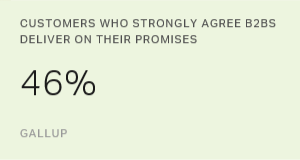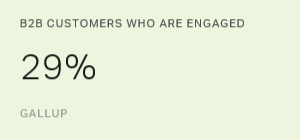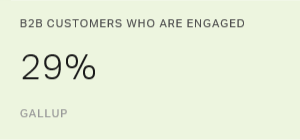Story Highlights
- Customers care more about the service they're buying than the provider
- Fewer than half of customers think B2Bs deliver on their promises
- Higher customer engagement drives better business outcomes
This article is the second in a two-part series.
Business-to-business (B2B) companies are at risk of losing many of their accounts. Fully 60% of their customers are indifferent.
Gallup's analysis shows that indifferent customers are less likely to want to expand their business with their existing vendors or be an early adopter of new products or services those companies might offer. That's why B2Bs risk losing their indifferent customers to other companies, regardless of their account size or history.
A big part of the problem is that when customers make their purchasing decisions, they really care more about the product or service they're buying than the company that provides that service. Put another way, they're buying the function, not the brand. This makes them a flight risk.
To reverse this trend, B2B companies should actively work to engage their customers with the company's brand or brand promise. If the brand promise is distinct enough, if the company effectively communicates its promise to the customer and if the company consistently delivers on its promise, then it can fully engage more of its indifferent customers.
Do Vendors Deliver on Their Promises?
B2B companies find delivering on their brand promise more difficult than they expect, though not necessarily for the reasons leaders might think. Gallup's analysis of B2B industry employees found that only 62% of them strongly agree that their company delivers on its promises.
When B2B leaders see that 62% figure, they tend to think it is incredibly low. Their initial reaction is that the number should approach 100% if the company is to be successful with its customers. Yet when Gallup asked customers if their vendors deliver on their brand promises, the percentage was even lower -- only 46% strongly agree.
Interviews Gallup conducted with B2B customers in various industries suggest that customers and vendors have differing views of what a company's brand promise should be. Customers say they want their vendors to be more "strategic" or more "innovative," but they have trouble defining exactly what they need from their partners.
This lack of clarity can be frustrating to B2B leaders. If leaders want to move their customer relationships beyond vendor status to true partnerships, Gallup research suggests they should focus on creating impact -- becoming so useful and providing so much value that a B2B company becomes essential to its customers' success.
To reach this level of trust, B2B companies must:
- know the customer's business
- bring the customer new ideas
- make these ideas work for the customer by tailoring them to the customer's marketplace and workplace
Engaging Customers Drives Key Business Outcomes
Gallup has found that engaging customers is the key to achieving crucial business outcomes -- including increased retention, share of wallet, sales and profitability. When that engagement is reinforced by impact, the benefits multiply.
Impact can be the catalyst that transforms indifferent customers into fully engaged ones. To create this transformation, B2B companies must convince customers that they are buying the brand -- not just the function. Each customer will define impact differently, but every B2B company can find a way to improve its customers' business.
If B2Bs' customers are to move from indifference to engagement, B2B leaders must commit their companies to serve customers by creating engagement and impact. This process starts by creating a brand promise that incorporates impact.
But leaders also need to develop and support a culture that empowers account teams to deliver and execute on new ideas. That is the only way a B2B can create the kind of impact that generates engagement and genuinely connects vendors and customers.



